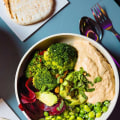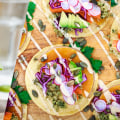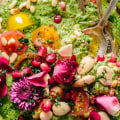Vegans avoid eating meat and animal by-products. These include meat, poultry, fish, dairy products, eggs, and foods made by bees. Dairy products are prohibited for vegans and include milk, cream, butter, cheese, yogurt, and sour cream. Countless products contain hidden dairy products, making them difficult to avoid.
Read the labels carefully to ensure that the products you buy are exclusively of plant origin. Vegans don't eat foods that come from animals, including dairy products and eggs. Most seeds are inexhaustible sources of nutrition, but flaxseed has a special place for vegans because it's an excellent alternative to eggs in vegan baked goods. There are a variety of reasons to follow a vegan diet, including ethical, health, or environmental concerns.
During pregnancy and breastfeeding, if you follow a vegan diet, you'll need to make sure you're getting enough vitamins and minerals for your child to develop healthily. A vegan diet may be high in iron, although iron from plant-based foods is absorbed by the body less well than iron from meat. We've established the definition of veganism and a list of non-vegan and vegan foods that you can incorporate into your plant-based diet to make your next trip to the grocery store a little easier. While there are many other elements in a vegan diet, fruits and vegetables are essential to any healthy diet.
It doesn't matter if the meat was cultivated or hunted; vegan dietary foods don't allow any animal products.
Veganism
is a way of life that seeks to exclude all forms of animal exploitation and cruelty, whether for food purposes or for any other purpose. If you choose to include animal foods in your diet, it won't detract from the positive benefits you'll get from a mostly vegan diet. When it comes to diet, vegan restrictions include not eating meat from any animal or food produced in any way, shape or form by animals.The Eatwell Guide applies to vegetarians, vegans, people of all ethnic backgrounds and those who have a healthy weight for their height, as well as those who are overweight. I think you'll agree with me when I say that knowing what you can and can't eat on a vegan diet can be quite overwhelming and confusing at first. A vegan diet is based on plants (such as vegetables, cereals, nuts and fruits) and on foods made with plants. You can get the nutrients you need by following a varied and balanced vegan diet that includes fortified foods and supplements.
This popular vegan food is incredibly rich in protein, antioxidants and minerals, and is used in all types of vegan cuisine, from sweet and creamy desserts to crispy fried pieces in a pan dipped in a tasty sauce. Studies have shown many times that the vegan diet (especially plant-based vegan) is the healthiest and most optimal for humans.


